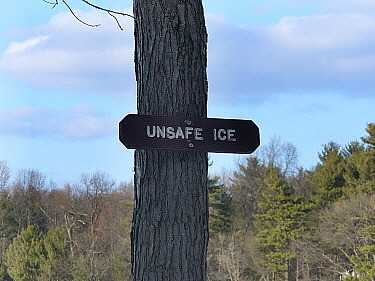I’ve always wondered about the odd pose the bronze Henry David Thoreau statue strikes outside the replica cabin at Walden Pond. Is Henry eternally frozen while staring at his fingers, or is there something in his seemingly empty palm that he is contemplating? When I was an admittedly odd child, I used to spend countless hours in bed at night contemplating my own hands, marvelling at the way they moved and gesticulated, their movements (even the most subtle) being something I could control without even thinking about it. What sort of divine designer, I wondered, invented something as simple and mundane as the human hand? Did God craft the Universe with similar-looking–albeit divine and supernaturally abled–hands, or is God’s handiwork of an entirely different kind than ours?
Having stared more than a bit at my own hands and fingers, I’ve always smiled at Thoreau’s bronze statue: was Hank a kindred spirit? After sauntering through the slippery, sand-like snow at Walden Pond yesterday, I had to smile–and snap a picture–when I saw the work of unknown, presumably human hands who’d rolled a snowball for Henry’s brazen consideration. In Shakespeare’s Hamlet, Hamlet encounters the barren skull of a deceased old friend and laments his passing while contemplating his skull: “Alas, poor Yorick!” Is Thoreau thinking something similar as he contemplates what looks like snowy skull, marveling at the impermanence that brings snow in February, melt in March, and green leaves in April and May?
I’ve lived in New England for about fifteen years now, and during that time I’ve circled Walden Pond countless times, in various weathers, both alone and with companions. Yesterday Leslee, some mutual friends, and I stomped and slipped through the squishy, sometimes ice-crusted snow that circles the pond, occasionally stepping aside to let hikers with snow-shoes, boots, and YakTrax pass us in the opposite direction.
The ice at Walden Pond looks solid these days, and yesterday we saw several hardy souls traversing it on skis: a chilly, wind-blown endeavor. And yet, signs urged us to distrust the pond’s seemingly solid, snow-clad surface, as did several thinning spots where dark water seemed ready to breach the skimming surface of pristine white snow. Alas, poor Henry, the lesson of snow, skulls, and dead writers is that impermanence surrounds us: although a brazen figure stands in all weathers outside a replica of Thoreau’s humble house, the snow in his hands is destined to pass, melting in the hot hands of spring’s eventual thaw.



Feb 19, 2007 at 2:48 pm
Very nice. I left the Thoreau examination of snow to you, since you saw it first. Plus as a nature writer, you and HD are on more intimate terms (N.B. “Hank”) and I knew you’d have a more thoughtful meditation on the meaning of his contemplation.
LikeLike
Feb 19, 2007 at 3:00 pm
If you were an odd child examining your hands, then I was just such a one. I always wanted to take close up photos of the creases and intermeshing of fingers and palms, and never could make it look like what I saw. The red glow of sunlight thorough the muscle and skin.
Having studied hand anatomy, and seen fistfulls of hand surgery, my fascination has never waned. Hands are amazing.
LikeLike
Feb 19, 2007 at 3:20 pm
It’s amazing how many of us have been thinking, and blogging, about hands lately! I love this contemplation.
LikeLike
Feb 20, 2007 at 9:27 am
That photo is priceless.
LikeLike
Feb 20, 2007 at 2:47 pm
The photo with the “unsafe ice” sign would make a nice print with a warNing about global warMing:
“Melting ice in February at Walden Pond? Park that SUV today, and hike like Henry!”
LikeLike
Feb 20, 2007 at 11:40 pm
I visited Walden Pond once in a rental car when I was by myself, and it was winter. I didn’t even get out of the car. One of these days I’ll see it in person–although I love this photo of Thoreau contemplating his snow ball. I know what you mean by hands. I have a photo of my own hand on my blog today. Seredipitous.
LikeLike
Feb 24, 2007 at 12:30 pm
I agree, that is an entirely cool picture! What serendipity to see him like that!
LikeLike